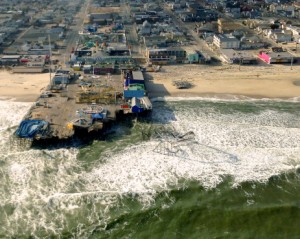
Thousands of homes and buildings were damaged or destroyed during Hurricane Sandy, and many homeowners continue to fight with their insurers over bad faith insurance practices in order to get the money they need to repair and rebuild. However, some structures that have not been repaired or torn down are posing safety concerns. New Jersey Gov. Chris Christie recently announced that the state will begin demolishing unsafe structures in the nine counties hit hardest by the Superstorm.
Making Communities Safer From Fire & Health Hazards and Physical Dangers
According to The Patch, Gov. Christie recently signed an executive order that officials say will help local municipalities raze unsound, unsafe and uninhabitable Sandy-damaged homes and buildings that pose significant risks to communities and undermine recovery efforts.
The order takes effect immediately and designates the state’s Department of Community Affairs (DCA) Commissioner to oversee efforts to demolish storm-damaged structures located in the nine counties most affected by Hurricane Sandy. As determined by the U.S. Department of Housing and Urban Development (HUD), the counties are:
- Atlantic County
- Bergen County
- Cape May County
- Essex County
- Hudson County
- Middlesex County
- Monmouth County
- Ocean County
- Union County
Although the Christie administration acknowledged that local officials and property owners in these areas have made “significant strides” to remove unsafe and dilapidated homes and buildings, there are still many structures that pose safety and health hazards and are impeding recovery efforts.
Christie’s executive order creates the Unsafe Structure Demolition Program, which will use $15 million in federal Community Development Block Grant Disaster Recovery funding from HUD to:
- identify and demolish unsafe structures
- remove debris
- perform any additional activities related to demolitions
Here’s how the process will work: DCA officials will identify which properties pose a public hazard in each of the nine counties most affected by Sandy and recommend demolition. Notices will be sent to property owners, who can either accept or reject the demolition proposal. Those who reject it will have the right to apply to the DCA for a hearing and the right to challenge the state’s determination in state court.
Challenging Insurer Decisions
Similar to New Jersey’s plan above, anyone who has been denied legitimate homeowners’ proceeds from Hurricane Sandy has the right to dispute an insurance company’s decision.
Insurance policies are legal contracts between a homeowner and an insurance company. As a homeowner, you pay premiums in return for the insurance company to assume certain risks – such as those which occur during a hurricane. Unfortunately, insurance company policies are commonly written in legalese and interpreted in ways that benefit insurers – often leaving homeowners to fight for what is rightfully theirs.
However, insurance companies have a legal duty to deal with policyholders fairly and in good faith. The “Covenant of Good Faith and Fair Dealing” means that insurers must make reasonable efforts to compensate you for your losses and deny your claim only if they have conducted a fair and reasonably thorough investigation.
When insurers breach this duty, they may be acting in bad faith. You can fight back with the help of an experienced New York insurance dispute lawyer who understands how the insurance industry works, what legal options are available to you and, most importantly, how to get your claim paid – now.


